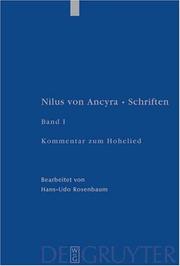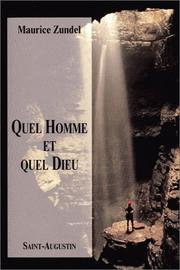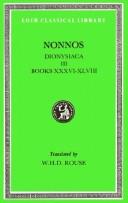| Listing 1 - 10 of 46942 | << page >> |
Sort by
|

ISBN: 3110178907 3110923998 9783110178906 Year: 2004 Volume: 57 1 Publisher: Berlin de Gruyter
Abstract | Keywords | Export | Availability | Bookmark
 Loading...
Loading...Choose an application
- Reference Manager
- EndNote
- RefWorks (Direct export to RefWorks)
Dieser Band ist der Auftakt einer Gesamtausgabe der Schriften des Nilus von Ancyra (gest. um 430). Es handelt sich um den ersten Versuch, den verlorenen Text des Hohelied-Kommentars aus der Katenenüberlieferung zu rekonstruieren. Eine ausführliche Einleitung informiert über Grundlagen und Methoden dieser Rekonstruktion; umfangreiche Register erschließen den Text. Die Zuschreibung des Kommentars an Nilus ist gesichert. Da dies für eine Reihe anderer unter seinem Namen gehender Schriften nicht gilt, kommt der Ausgabe auch unter diesem Aspekt grundlegende Bedeutung zu. This volume commences a complete edition of the writings of Nilus of Ancyra († ca. 430). It presents the first attempt to reconstruct the lost text of the commentary on the Song of Songs from the catenae sources. The introduction details the principles and methods used in the reconstruction, and comprehensive indexes provide access to the text. The commentary can definitely be attributed to Nilus; the edition is of fundamental importance for this reason too, as this is not the case for various other writings appearing under his name.
Book
ISBN: 8470393766 Year: 1971 Volume: vol 6 Publisher: Madrid Castalia
Abstract | Keywords | Export | Availability | Bookmark
 Loading...
Loading...Choose an application
- Reference Manager
- EndNote
- RefWorks (Direct export to RefWorks)

ISBN: 2880110068 9782880110062 Year: 1986 Publisher: Saint-Maurice : Editions Saint-Augustin,
Abstract | Keywords | Export | Availability | Bookmark
 Loading...
Loading...Choose an application
- Reference Manager
- EndNote
- RefWorks (Direct export to RefWorks)
Book
ISBN: 3110275457 9783110275452 Year: 1935 Publisher: De Gruyter
Abstract | Keywords | Export | Availability | Bookmark
 Loading...
Loading...Choose an application
- Reference Manager
- EndNote
- RefWorks (Direct export to RefWorks)
Dieser Titel aus dem De Gruyter-Verlagsarchiv ist digitalisiert worden, um ihn der wissenschaftlichen Forschung zugänglich zu machen. Da der Titel erstmals im Nationalsozialismus publiziert wurde, ist er in besonderem Maße in seinem historischen Kontext zu betrachten. Mehr erfahren Sie .› This title from the De Gruyter Book Archive has been digitized in order to make it available for academic research. It was originally published under National Socialism and has to be viewed in this historical context. Learn more .›
Book
ISBN: 3111433633 9783111433639 9783110152081 Year: 1938 Publisher: Berlin : Walter de Gruyter & Co.,
Abstract | Keywords | Export | Availability | Bookmark
 Loading...
Loading...Choose an application
- Reference Manager
- EndNote
- RefWorks (Direct export to RefWorks)
Apologia de Fuga Sua (C.19-27) - Apologia Secunda (C. 1-43).
Periodical
ISSN: 27842665 18420613
Abstract | Keywords | Export | Availability | Bookmark
 Loading...
Loading...Choose an application
- Reference Manager
- EndNote
- RefWorks (Direct export to RefWorks)
"... purpose is to provide researchers with a publication space for expressing ideas and research results—in the context of biblical faith—from the biblical-theological area and auxiliary disciplines, including exegesis and Old and New Testament theology, archeology of Palestine and the Middle East, systematic theology, historical theology and applied theology"--About, viewed April 28, 2023
Periodical
ISSN: 03615480 Publisher: Holland, Mich. [Western Theological Seminary]
Abstract | Keywords | Export | Availability | Bookmark
 Loading...
Loading...Choose an application
- Reference Manager
- EndNote
- RefWorks (Direct export to RefWorks)

ISBN: 0674993918 Year: 1940 Publisher: Cambridge, MA : Harvard University Press,
Abstract | Keywords | Export | Availability | Bookmark
 Loading...
Loading...Choose an application
- Reference Manager
- EndNote
- RefWorks (Direct export to RefWorks)
Annotation Nonnos of Panopolis in Egypt, who lived in the fifth century of our era, composed the last great epic poem of antiquity. The Dionysiaca, in 48 books, has for its chief theme the expedition of Dionysus against the Indians; but the poet contrives to include all the adventures of the god (as well as much other mythological lore) in a narrative which begins with chaos in heaven and ends with the apotheosis of Ariadne's crown. The wild ecstasy inspired by the god is certainly reflected in the poet's style, which is baroque, extravagant, and unrestrained. It seems that Nonnos was in later years converted to Christianity, for in marked contrast to the Dionysiaca, a poem dealing unreservedly with classical myths and redolent of a pagan outlook, there is extant and ascribed to him a hexameter paraphrase of the Gospel of John. The Loeb Classical Library edition of the Dionysiaca is in three volumes.
Periodical
Abstract | Keywords | Export | Availability | Bookmark
 Loading...
Loading...Choose an application
- Reference Manager
- EndNote
- RefWorks (Direct export to RefWorks)
Periodical
ISSN: 10113010 Year: 1917 Publisher: Tessaloniki: Metropolis Thessaloniki,
Abstract | Keywords | Export | Availability | Bookmark
 Loading...
Loading...Choose an application
- Reference Manager
- EndNote
- RefWorks (Direct export to RefWorks)
| Listing 1 - 10 of 46942 | << page >> |
Sort by
|

 Search
Search Feedback
Feedback About UniCat
About UniCat  Help
Help News
News